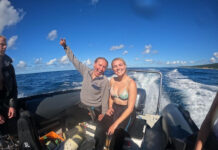
Valeria Sabate
Staff Writer
‘Voces del Mariel’ Documentary is going to be televised in Nat Geo Mundo on April 6 and 11. Also, it is nominated to the Madrid International Film Festival as best documentary.
“The most surprising two things that have happened is…is that we found out that the documentary is going to be shown in Nat Geo Mundo,” Garcia said.
It is going to be the first time that the documentary will reach a national level audience. It will be broadcasted at 8 p.m.
National Geographic got interested in the documentary. They reviewed it for few months and at the end decided to show it.
“Ironically it is going to coincide with the anniversary of Mariel Boatlift. The boatlift itself began later than April, however it was in April first that five Cubans got into the Peruvian embassy. This was the event that triggered everything that happened after that,” Garcia said.
According to Garcia, National Geographic got interested in the documentary because it is one “of the most comprehensive” documentaries that it has been done about the Mariel Boatlift.
“In addition of gathering and rescuing the history of the Mariel Boatlift it is also a documentary that shows for the very first time the return of a former Mariel Boatlift refugee back to Cuba to gather the testimonies,” Garcia said.
No one has done that perspective about the topic before, to recollect testimonies and record on a camera the people that the refugee left behind, according to Garcia.
“This was a little bit different from documentaries because of the fact we actually went back almost without really telling everybody that we were going back,” Garcia said.
His goal was to capture the natural and spontaneous reaction from the Cuban people.
“I think it is interesting is that this documentary goes very well with the TV. Everybody in the world knows the political situation about Cuba, but they don’t know that it has a human face and what Cubans have gone through,” Garcia said.
Garcia expects people to capture the human reaction towards what is happening in Cuba through the documentary.
“It is even very important in Florida’s history. I want people at large in the United States to learn about the human tragedy and put a human face of what Cuban people have endure over the last 55 years,” Garcia said.
The Cuban government could watch the documentary, but Garcia believes that his duties as an educator have more weight than being afraid of the government.
“As a Cuban that loves his country and as a Cuban-American, I think it is my responsibility to rescue history and share it with other people. Perhaps there is a little bit of fear. I think we Cubans that were born in 1959, fear has been a very important part of who we are,” Garcia said. “My sense of responsibility as an academic and as an educator it is probably stronger than the fear that I might feel.”
The documentary was released in the Gasparila film festival in 2011 where it won best audience documentary.
“It was quite a surprise for us because it was the first ever shown,” Jose Garcia, professor of Spanish and Latin American studies, said.
After that achievement, the documentary won two more awards: Best Caribbean documentary at the Aruba International film Festival – one of the most important films festivals in the Caribbean—and in Alexandria Film Festival, where it won the “Best of the Fest.”







